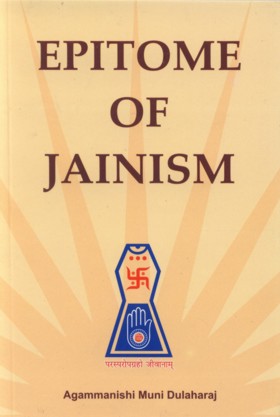Once Lord Mahavira was sojourning in Champa. He was absorbed in profound meditation. The serenity and tranquillity of his posture was scintillating sparks of awakened consciousness. The whole atmosphere was spell- bound by its profound silence and mystery.
A disciple approached the Lord and sat there gazing at the mysterious face of the Lord. After a while, the Lord opened His eyes. The aspirant touched the feet of the Lord and asked - ‘Lord! Can one break the shackles of worldly fetters and reach the city of emancipation even without treading the path of traditional religion?’
Then Lord Mahavira spoke to the disciple, ‘Vatsa! Remember, when the soul becomes pure by annihilating the bondage of Karmas and when the religion becomes one with the soul, a person’s final emancipation is certain, even though he does not follow the rigmarole of rituals and does not adhere to the traditional religious norms.’
‘Vatsa! One who forsakes all the worldly pleasures and cuts asunder the sexual cravings and influences one’s whole personality with spontaneous religion, reaches the abode of perfection.’
‘Lord! Is it necessary to become a monk to attain emancipation?’ The Lord replied smilingly, ‘Vatsa! The acquisition of Nirvana is not bound by the form or name, time or clime. Monkhood is not found in any particular form or name. It abides in a person whose solemnity and tranquillity is manifested. One who is pure in word and deed, and is unattached to worldly affair's but equally attached to renunciation is a monk. One who is composed and pure, emancipates even in the dress of a householder. Form and name are secondary in the realm of Nirvana.’
‘My Lord! Can one become free and independent even though he does not believe in your commandment?’
Lord replied, ‘Vatsa! One who is endowed with the trinity of right perception, right knowledge and right conduct is a real monk and he can work out his emancipation without any hindrance, whatsoever. Naturally from this trinity there originates an aureole of golden brightness which is the sign of enlightenment. Be assured, my beloved Vatsa! That the sentient beings cut asunder the chain of succession of deaths and births and realise the self-purifying brightness of the soul.’
‘Vatsa! Monkhood is not centralised in any one association. It is there where purity abides. Do not foster ill-will towards others. It is good to have firm faith towards one’s own religion and tradition. But to have hatred and spite towards others to a mean consideration leads one to fall low in the abyss of ignorance. One should subdue one’s own worldly attachments and contaminations.’
This makes it crystal clear that Jainism is a universal religion, the boundary of which extends far and wide. It is free from narrow consideration based on form and name, dress and caste etc. It expounded its norms of religion having the catholicity of religion as its viewpoint.
It never stressed that only Jains can reach the abode of God and non-Jains will lag behind. It gives equal opportunities to one and all to be pure and sacrosanct. It said—‘Serenity leads to perfection. Rituals are secondary. They should be framed in such a way that they inspire an aspirant in the direction of purification and high dedication. If the whole personality of a person is scintillated with the sparks of awareness, emancipation is at hand’s length.
All these speak of the universality of Jain religion.
Epitome Of Jainism: Universality Of Jain Religion
Author:
 Agammanishi Muni Dulheraj
Agammanishi Muni Dulheraj
 Agammanishi Muni Dulheraj
Agammanishi Muni Dulheraj
Published: 07.01.2018
Updated: 09.01.2018
Updated: 09.01.2018
Sources
Title: Epitome Of Jainism
Publisher: Jain Vishva Bharati, Ladnun, India
Edition: 2011
Language: English
Pages: 55
Publisher: Jain Vishva Bharati, Ladnun, India
Edition: 2011
Language: English
Pages: 55

Page glossary
Some texts contain footnotes and glossary entries. To distinguish between them, the links have different colors.
Page statistics
This page has been viewed 494 times.